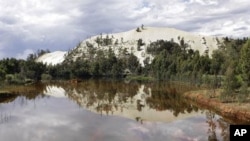Several African governments have declared their intention to assert greater control over private sector mining operations and transfer the revenue to weaker areas of their economies. Africa's new "developmental states" are moving from regulating the mining industry to more direct involvement.
The so-called "Addis Ababa Declaration" approved at a conference of African mining ministers would effectively change the government's role from regulator to director of the mining industry. Roughly half of Africa's 54 countries were represented at the conference, including seven at the ministerial level.
The declaration expresses concern at Africa's poverty and underdevelopment. It lays out a vision of developmental states that “integrate the mining sector into broader social and economic developmental processes to maximize the benefits” from exploiting mineral resources.
Wikipedia defines the “developmental state” as the phenomenon of state-led macroeconomic planning in which governments take more control of the economy.
Antonio Pedro of the United Nations Economic Commission for Africa was among the drafters the declaration. He says the Africa Mining Vision signals a shift in the way governments view their relationship with the mining industry.
"We are moving from a period where each government in Africa was trying to have the best possible fiscal regimes and incentives to attract investment, to a period where governments are trying to ensure that mineral resources can contribute to broad based development," said Pedro.
Pedro says private sector mining firms in a developmental state will be expected to reduce the emphasis on what he called “profit maximization” and focus more on social responsibility.
"Now they have what is known as a social license to mine," he added. "If you do not earn that social license, you will not be able to carry out with your profit maximization value proposition because your communities will encroach on your property, you will not be able to mine."
Ethiopia's Mining Minister Sinkinesh Ejigu told the conference governments face a big challenge in monitoring and negotiating with large mining and oil companies with vast international experience. Ethiopia last month stopped issuing new mining licenses, saying it needed time to re-evaluate the licensing process.
Minister Sinkinesh told Reuters, “our task is not only giving licenses, we have to administer.”
The African continent produces more than 60 metal and mineral products, and is a major source of gold, diamonds, cobalt, and uranium. But mining experts say Africa is one of the world's under-explored regions.
The new push for greater government involvement in mining comes as the 2003 Kimberley Process to prevent so-called “conflict diamonds” from reaching the marketplace, is in tatters.
The international advocacy group Global Witness quit the Kimberley Process Certification Scheme this month, saying the watchdog had failed to stop diamonds from fueling corruption and violence in Zimbabwe.
Critics say the Kimberley Process has allowed President Robert Mugabe's ZANU-PF party to siphon off millions of dollars in profits from the sale of conflict diamonds.




